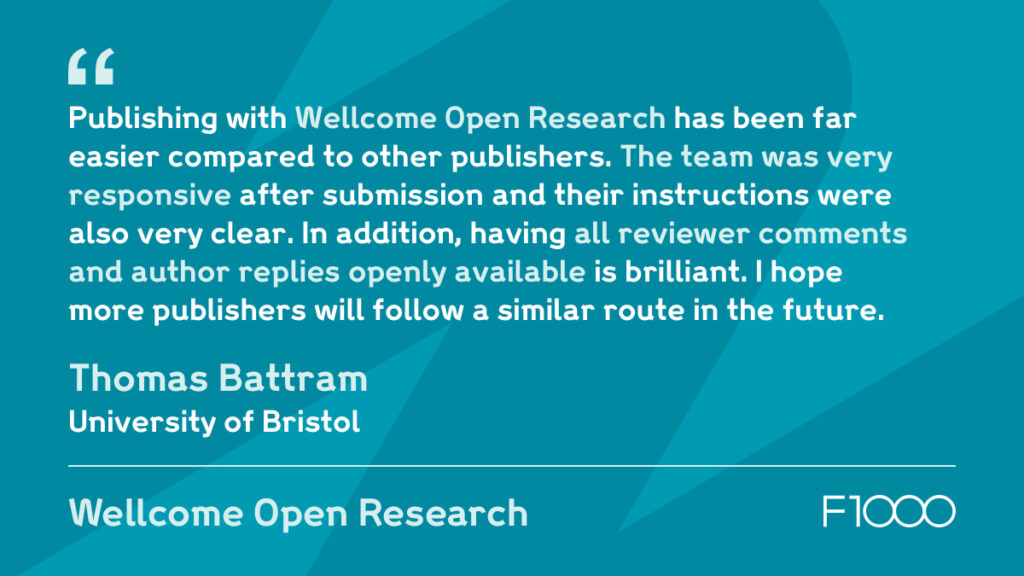Infectious Diseases
Antimicrobial Research
Resistance to drugs is increasing globally. New forecasts from the Global Research on Antimicrobial Resistance (GRAM) Project estimate that bacterial antimicrobial resistance (AMR) will cause 39 million deaths between 2025 and 2050.
Antimicrobial resistance (AMR) is a key focus area for Wellcome Trust.
As a massive public health threat where low-and middle-income countries shoulder the highest burden of drug-resistant infections, Wellcome is looking to bring innovative solutions to combat infectious disease with collective, evidence-based, urgent action to protect human, animal and environmental health and save millions of lives.
Wellcome Open Research
Wellcome Open Research is an Open Research publishing platform that provides all Wellcome-funded researchers with a place to rapidly publish any results they think are worth sharing.
All articles benefit from rapid open access publication, transparent peer review and editorial guidance on making all source data openly available.
Wellcome Open Research is free to publish if you are funded by Wellcome Trust
Five Key Benefits of Publishing with Us
Research transparency:
All research is published freely and openly, including any data used within research, to ensure maximum transparency, reproducibility, and collaboration.Speed of publication:
Peer review is conducted post-publication to ensure new research findings can be shared without delay.No publication charges: As recipients of Wellcome funding, there are no costs to authors publishing on the platform.
Open peer review:
Peer review is conducted openly to ensure full transparency and enable others to build upon expert guidance.All research outputs welcomed:
All research outputs can be published, from traditional Research Articles to Data Notes to Study Protocols. All results are welcomed, including negative or null results and reanalysis of previous studies with new results.

Gateways on Wellcome Open Research
Wellcome Open Research accepts research across the spectrum of infectious diseases. However, there are Gateways that showcase research linked to a specific Wellcome Centre or Wellcome-funded programme.
To explore more about Infectious Diseases and to access research publications, visit the Gateways below:
AHRI
Africa Health Research Institute (AHRI) is a multi-disciplinary, independent health research institute based in the province of KwaZulu-Natal, South Africa.

Africa Health Research Institute (AHRI) Household Contact study: a study protocol, statistical analysis and modelling plan.
GLIDE
The Oxford-Johns Hopkins Global Infectious Disease Ethics Collaborative (GLIDE) aims to provide a flexible collaborative platform for identifying and analysing ethical issues arising in infectious disease treatment, research, response, and preparedness, through the lens of global health ethics.

Ethics, equity, climate change, and infectious disease research: a scoping review:
KEMRI
The KEMRI-Wellcome Trust Research Programme has delivered internationally competitive research and capacity building for the last 27 years. We work across 3 main hubs in Kenya and Uganda: Nairobi, Kilifi and Mbale, with international reach through collaborating sites.

SEVUparin as a potential Adjunctive Treatment in children with severe malaria: A phase I trial safety and dose finding trial (SEVUSMAART)
MORU
Established in 1979 as a research collaboration between Mahidol University (Thailand), Oxford University (UK) and the UK’s Wellcome Trust, the Mahidol Oxford Tropical Medicine Research Unit (MORU) conducts targeted clinical trials and public health research that aims to discover and develop appropriate, affordable interventions that measurably improve the health of people living in resource-limited parts of the world.

“AMR Dialogues”: a public engagement initiative to shape policies and solutions on antimicrobial resistance (AMR) in Thailand.
Understanding hospital antimicrobial prescribing decisions and determinants of uptake of new local antimicrobial prescribing guidelines in Laos.
OUCRU
The Oxford University Clinical Research Unit (OUCRU) is a large-scale clinical and public health research unit with campuses in Ho Chi Minh City and Hanoi in Viet Nam, Kathmandu in Nepal (OUCRU-Nepal) and Jakarta in Indonesia (Eijkman-Oxford Clinical Research Unit).

Case Report: Multi drug resistant tuberculosis in an 18-month-old boy with seizure, vomiting, and loss of vision
WCIP
Wellcome Centre for Integrative Parasitology’s mission is to develop a deeper understanding of parasites in order to identify new targets for therapeutics. We study parasites from several genera and focus on core processes, many of which show common mechanisms in the different parasites.

Untargeted metabolomics to understand the basis of phenotypic differences in amphotericin B-resistant Leishmania parasites.
Submitting your research to Gateways showcases your publication alongside peer contributions from your research community.
Be part of the solution and contribute to improving outcomes to prevent infectious disease escalation.
Publish with Wellcome Open Research Today
Join our mailing list
Be the first to know about calls for papers, new content, researcher stories and more. Sign up to the Wellcome Open Research mailing list today.
